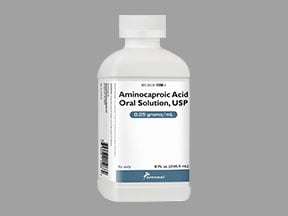
Aminocaproic Acid Coupons & Savings Card – Discount Prices from $123.02
Generic for: Amicar
My prescription
Edit
236.5ML of 0.25GM/ML, Aminocaproic Acid (1 Bottle)
Select pharmacy

CVS
$123.02
COUPON PRICE
Walgreens
$188.03
COUPON PRICE
Albertsons
$198.25
COUPON PRICE
Walmart
$2555.78
COUPON PRICEAminocaproic Acid savings card
Show this card to your pharmacist
CVS
$123.02
BIN
ID
PCN
GRP
019876
LH5A97F3D6
CHIPPO
LHX
Powered by
More prescriptions for hemorrhage
More prescriptions for hemorrhage
Price history for Amicar (brand) & Aminocaproic Acid (generic)
1 Bottle, 236.5ML of 0.25GM/ML
Average retail price for Amicar
Average retail price for Aminocaproic Acid
Average SaveHealth price for Aminocaproic Acid
Our price history data is based on aggregated prescription data collected from participating pharmacies in America. Our prescription data updates daily to reflect the latest price changes. If you notice a missing data point, it means there wasn't sufficient data available to generate a monetary value for that date.
We analyzed Aminocaproic Acid prices for (236.5ML of 0.25GM/ML, 1 Bottle) over the last 12 months. The average retail price was $2717.80, while the average price using the SaveHealth discount card was $221.04. That's a savings of approximately 91.87% when using our Aminocaproic Acid coupon.
Compared to the generic version, Amicar had an average price of $1611.99 over the same time period. With the SaveHealth savings card, Aminocaproic Acid is 86.29% cheaper on average than Amicar.
*Retail prices are based on pharmacy claims data, and may not be accurate when we don't have enough claims.
Aminocaproic Acid dosage forms
Dosage Quantity Price from Per unit 1GM 1 Bottle $1.01 $1.01 1GM 2 Bottles $1.01 $0.51 1GM 3 Bottles $1.01 $0.34 236.5ML of 0.25GM/ML 1 Bottle $123.02 $123.02 236.5ML of 0.25GM/ML 2 Bottles $227.74 $113.87 236.5ML of 0.25GM/ML 3 Bottles $340.47 $113.49
| Dosage | Quantity | Price from | Per unit |
|---|---|---|---|
| 1GM | 1 Bottle | $1.01 | $1.01 |
| 1GM | 2 Bottles | $1.01 | $0.51 |
| 1GM | 3 Bottles | $1.01 | $0.34 |
| 236.5ML of 0.25GM/ML | 1 Bottle | $123.02 | $123.02 |
| 236.5ML of 0.25GM/ML | 2 Bottles | $227.74 | $113.87 |
| 236.5ML of 0.25GM/ML | 3 Bottles | $340.47 | $113.49 |
Aminocaproic Acid Warnings
This document outlines critical safety information and warnings for the use of this medication. It is essential to understand these aspects to ensure safe and effective treatment. If you have any questions or concerns, please discuss them with your healthcare provider.
Muscle Weakness: There is a risk of developing muscle weakness with prolonged use of aminocaproic acid (Amicar). Monitor your condition if you are on long-term therapy.
Contraindications: There are specific situations where this medication should not be used due to potential serious health risks:
- Presence of active blood clots in the bloodstream.
- If the source of bleeding is not identified. Should any of these conditions apply to you, it is crucial to consult your healthcare provider before starting this medication.
Aminocaproic Acid Side Effects
Common side effects:
- Headaches
- Stomach pain
- Loss of appetite
- Nausea
- Vomiting
- Diarrhea
- Unusual tiredness
- Dizziness
- Stuffy nose
- Watery eyes
Less common but important to monitor:
- Muscle weakness or pain
- Rash
- Fluid retention
- Swelling
- General feeling of tiredness or discomfort
Serious side effects:
- Persistent sore throat
- Ringing in the ears
- Vision changes
- Signs of kidney problems
- Confusion
- Slow heartbeat
- Unusual bleeding or bruising
- Blood clots
- Very serious allergic reaction
Aminocaproic Acid Interactions
Interactions with moderate risk that may require dose adjustment, closer monitoring, or timing changes:
- Factor IX complex
- anti-inhibitor coagulant complex
- Tretinoin
